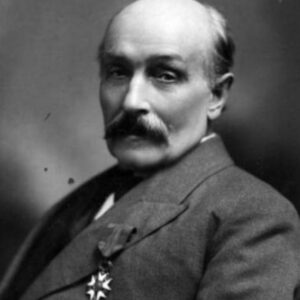Sir William Randal Cremer was an English pacifist and 1903 Nobel Peace laureate. He served in the British Parliament as a member of the Liberal party. He was awarded the Nobel Peace Prize for advocating for arbitration and peaceful resolution of disputes between nations rather than going to war with one another. Due to his views on international arbitration as a means of resolving conflicts, his colleagues in Parliament affectionately dubbed him the ‘Member of Arbitration.’ His early life was extremely humble and fraught with adversity. His father abandoned his mother when he was a small child. His mother was a devout Methodist who, despite her despair, raised her son and two daughters until he was old enough to fend for himself. The adversity of his upbringing could not quell his indomitable spirit, and he rose from abject poverty to become a great man in his own right. Throughout his education, he learned about the importance of bringing warring nations to the negotiating table in order to reach a peaceful resolution. This lecture cemented in his mind the concept of international arbitration between contending nations, which became his life’s primary objective.
Childhood & Adolescence
William Randal Cremer was born on March 18, 1828, in the small English town of Fareham. His father was a coach painter and abandoned his mother, a simple housewife, who was left to raise her children in abject poverty.
On his mother’s insistence, he attended his early education in a Methodist church school. He began his career as an apprentice in his uncle’s company at the age of fifteen and later became a full-fledged carpenter. Initially, he worked as a carpenter in shipyards.
Career of Randal
In 1852, William Randal Cremer moved to London to seek his fortune in the workers movement. He became a member of a council at the age of thirty, fighting for the implementation of a nine-hour workday. In the same year, he led a demonstration of 70,000 men protesting a lockout.
He organized a statewide union of carpenters and jointers. In 1865, he assisted in the formation of the ‘International Working Men’s Association’ and was elected secretary.
He resigned from his position in 1867, believing the organization was becoming radicalized. He contested from Warwick in 1868, believing that labor issues should be highlighted in Parliament.
He advocated for universal suffrage, compulsory education for all, the imposition of direct taxes, land law reforms, amendments to labor union laws, and the establishment of international arbitration courts, but was defeated in the election. In 1874, he was again unsuccessful.
The reform bill of 1885 established an entirely new constituency of workers, who elected him to Parliament the following year. In 1886 and 1892, he was re-elected.
He was defeated in 1895 but reclaimed his seat in 1900, which he held until his death. He believed that humanity could coexist peacefully only if there was peace, and in 1870 established a committee of working people as a neutral body to attempt to resolve the Franco-Prussian conflict.
This organization became known as the ‘Workmen’s Peace Association’ in 1871 and was instrumental in the formation of the ‘International Arbitration League’ later that year.
In 1887, Cremer persuaded 234 members of the British Parliament’s ‘House of Commons’ to sign a resolution urging US President Cleveland to resolve all disputes through arbitration, which he personally presented to the American President as head of a British delegation.
Through his efforts, he attracted the attention of another pacifist, Frederick Passey, who invited him to a meeting in Paris in 1888 that resulted in the formation of the ‘Inter-parliamentary Union.’
The first meeting of this body occurred in 1889, when eight nations gathered to elect Cremer as the Union’s Vice-President. He also became the British group’s secretary.
In 1899, at the Hague Conference, he was successful in establishing a court for international arbitration. He was vehement in his criticism of the British government for its involvement in the South African Boer War.
Awards and Accomplishments
In 1907, King Edward VII knighted William Randal Cremer and allowed him to abstain from wearing a sword during the swearing-in ceremony.
In 1903, he was awarded the Nobel Peace Prize for his efforts to persuade nations to resolve disputes peacefully through arbitration and negotiations.
Personal History and Legacies
His first wife died in 1876, and his second wife died in 1884, leaving him a widower. He had no children from either of his marriages. William Randal Cremer died of pneumonia in London on July 22, 1908.
He led a simple life, worked long hours, and was passionate about all aspects of nature and the environment. He bequeathed £7000 and later another £1000 in prize money to the League, where he served as secretary.
Humanitarian Service of Randal
He spent his entire life attempting to bring nations at war to the negotiating table so that all issues could be resolved peacefully and amicably.
His efforts included attempting to end hostilities between the British and American governments and resolving their differences through arbitration and negotiation.
Estimated Net Worth
The net worth of Randal is unknown.
Trivia
Though William Randal Cremer identified as a simple working man and represented the interests of all other workers in Parliament, he did not believe workers should participate in a revolution.


